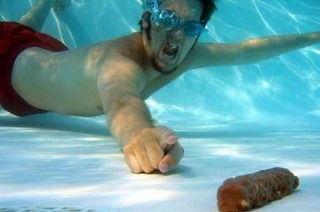It was about 105 F when Amy and Sorenne and I touched down in Phoenix yesterday afternoon, to visit family and do some work. Pools – and air conditioning – become increasingly popular in Phoenix and elsewhere as the temperatures climb.
So that means the annual increase of cryptosporidium and other bugs related to exposure in swimming pools. Debate has raged over the past couple of years in various communities: what’s the best way to keep poop out of pools, especially with kids in diapers (I have one of those).
.jpg) The U.S. National Swimming Pool Foundation marked the emergence of summer by sending out a press release today about some research presented in March by researchers from University of North Carolina-Charlotte that found swim diapers help slow the release of disease-causing germs, but the benefits are short lived.
The U.S. National Swimming Pool Foundation marked the emergence of summer by sending out a press release today about some research presented in March by researchers from University of North Carolina-Charlotte that found swim diapers help slow the release of disease-causing germs, but the benefits are short lived.
The researchers measured the amount of microspheres that released from swim diapers worn by children. The microspheres have a similar size (five microns) to that of Crypto. Normal swim trunks, common disposable diapers and reusable diapers with and without vinyl diaper covers were tested. Swimming trunks without a swim diaper of any kind had the poorest performance – almost 90% of the microspheres were released into the water within one minute.
 Swim diapers released about 50% of the microspheres within one minute. A vinyl diaper cover placed over a disposable swim diaper slightly improved performance. Still, over 25% were released into the water within two minutes.
Swim diapers released about 50% of the microspheres within one minute. A vinyl diaper cover placed over a disposable swim diaper slightly improved performance. Still, over 25% were released into the water within two minutes.
"When a fecal accident contains about a billion disease-causing Crypto oocysts, hundreds of millions of oocysts get into the water within minutes," explains Dr. James Amburgey, the lead scientist in the study. "Swimmers only need to ingest about ten Crypto oocysts to become infected."
"This study confirms that parental restraint is the key to preventing Crypto outbreaks – not swim diapers. Swimming with diarrhea is irresponsible because it places other people’s health at risk," reinforces Thomas M. Lachocki, Ph.D., CEO of the National Swimming Pool Foundation(R) (NSPF(R)) who funded the research.
